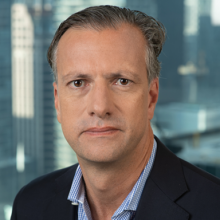Craig Bergstrom | Managing Partner and Chief Investment Officer | Corbin Capital Partners | Source

Craig Bergstrom | Managing Partner and Chief Investment Officer | Corbin Capital Partners
Craig Bergstrom is Managing Partner and Chief Investment Officer of Corbin Capital Partners, a woman-led independent alternative asset management firm that specializes in multi-strategy hedge fund and opportunistic credit investing ($8.4B AUM). Craig leads Corbin's investment team and has been with the firm for over 20 years. He can speak to several topics in the credit space, including distressed credit, private credit, CLOs, CBOs and secondaries. He works on all aspects of Corbin's investment process with a special focus on implementation capabilities, co-investments and direct investing efforts, as well as new initiatives. Craig previously worked at Grantham Mayo Van Otterloo, Salomon Smith Barney, and Morgan Stanley and was awarded the CFA charter in 1997.
-
Showcase your professional journey! Share your employment history to highlight your industry experience and achievements, making you a sought-after expert.
-
Bloomberg Intelligence FICC Focus: Corbin’s Bergstrom on Credit Landscape: State of Distressed Debt
In this episode, Bloomberg Intelligence global credit strategy head Noel Hebert and distressed credit analyst Philip Brendel host an in-depth feature interview with Craig Bergstrom on the current credit opportunity set, private credit and evaluating credit funds.
Podcast -
Bloomberg: Creditor Fights Only Benefit Lawyers, Corbin CIO Says
The rise of fights among creditors is ultimately a zero-sum game that only benefits lawyers, according to Craig Bergstrom, the chief investment officer of Corbin Capital, which manages around $8.5 billion.
Article -
FundFire: Is the Time Finally Right for a Credit Hedge Fund Rebound?
So far, this year has brought “muted” performance recovery across most credit hedge funds, said Craig Bergstrom, CIO at $8.4 billion Corbin Capital Partners, which runs an $2.6 billion opportunistic credit evergreen fund that invests across the credit spectrum and a closed-end fund investing in private credit with about $1 billion in committed capital. Many past cycle predictions in the space haven’t come to pass, he added.
Article
-
“We think the credit hedge fund space is structurally challenged in some ways vis-à-vis the closed end credit space,” Bergstrom said, adding, “There’s more opportunity to differentiate yourself in size or niche in the closed end credit asset fund format than traditional open ended credit hedge funds.”
-
“People predict distressed cycles a lot more frequently than they actually materialize. It has been two years away for a very, very, very long time,” he said.
-
“I worry less about liquidity risk because we’re generally assuming there isn’t liquidity there. I worry more about recovery risk. If something goes wrong in a small-cap stack…a lot of the advisory, workout and bankruptcy costs are much more onerous in a smaller-cap stack.”
